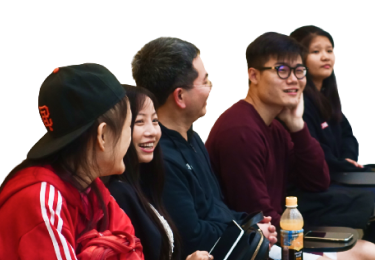
Bachelor of Arts (Hons) in Translation, Cross-Cultural Studies, and Corporate Communication
UGC-Funded • Self-Financed
We offer a wide variety of programmes and modes of study. Find out more about our programmes, including admission information, financial aid, and career prospects.
Articulation of appropriate objectives
As the provider of a humanities programme in Hong Kong’s only liberal arts university, Lingnan’s Honours Degree in Translation sets out to provide an education in bilingual studies which can produce graduates with the capacity to think for themselves as well as with bilingual competence in Chinese and English. The nature of translation courses determines that both English and Chinese must be used as media of instruction to enable students to achieve a reasonably high level of communicative competence in both Chinese and English, to develop their capacity for translating between the two languages and to understand differences and similarities in the cultural, political and linguistic environment which affect translation and interpreting. Our translation graduates, with their good bilingual skills, are very competitive in the job market.
Curriculum design
The aim of our curriculum is to ensure a broad and balanced curriculum which prepares students for their career development after graduation. Sufficient practical translation courses are offered in response to the needs of the job market without compromising academically challenging courses to train students in critical thinking, preparing them for further studies. Each year a number of students enroll in postgraduate programmes either locally or overseas. In order to help students attain a higher degree of competence in translation, a year-long Final-Year Translation Project/Translation Studies Research Project is made compulsory for major student. There is a right balance between language proficiency and translation skills on the one hand, and between literary and cultural studies on the other. The cultural studies component is a unique feature among translation programmes in HK. Quite a number of new courses have been designed to cater to the needs of the core curriculum, such as Bilingual Cyber Culture; Bilingual Studies in Humour; Chinese Writing Workshop for Translators; Conference Interpreting; Cross-cultural Studies of Children’s Fantasy Literature; Cross-cultural Studies of Supernatural Literature; Dialogue Interpreting: Chinese and English; Food, Culture and Identity; Introduction to Computer-aided Translation; Liaison Interpreting; Madness and Literature; Reading Popular Fiction; Subtitling: Issues in Audiovisual and Digital Translation; and Vampires, Monsters, and the Gothic in Literature and Culture; Corporate Communication and Translation; Localization and Project Management.
Programme delivery, including resources, teaching mode, and student learning environment
The Department adopts a lecture/seminar, sectional approach and tutorial model as a significant component of the teaching and learning process for most of the courses except the Final-year Translation Project, in which case students each engage in an extended translation project spanning two semesters in their final year so that they can have ample opportunities to learn translation skills by working under the close supervision of a teacher-mentor on a one-to-one basis.
Out of classroom learning – Internship Programme and others
The University’s exchange programme with overseas universities has been very helpful. Translation students have done very well in competing for such opportunities to study overseas or in mainland China for a semester. The majority of students have been given such opportunities to study abroad in countries in America, Europe and Asia. Their horizons have been broadened and their language skills much enhanced.
Meanwhile, the Department also has an Internship Working Group responsible for making available to students internship opportunities with various local organizations. Some students have secured internships, and through these they earn practical experience in translation and interpreting. On the other hand, service learning components have been incorporated into a number of courses in the past couple of years, including Bilingual Cyber Culture, Subtitling: Issues in Audiovisual Translation and Culture, and Translation of Texts in Popular Culture (E-C & C-E).
The Department enjoys regional, national and international prestige, attracting high quality applicants to its programmes. It is particularly strong in the area of theoretical translation studies and translation history.
Translation department admitted its first MPhil student in 1995, and up to now, over 25 research postgraduate students have completed their studies. Its PhD graduates have secured teaching and research positions at high-ranking universities.